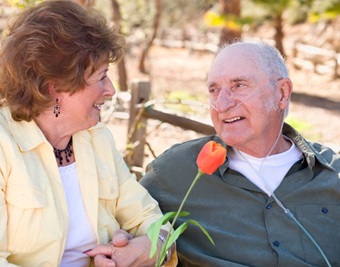Attention Caregivers: Discover Tips for Healthy Habits To Stay Healthy Yourself
It’s a message you’ve heard countless times sitting on an airplane getting ready to take off. “In the unlikely event of a loss of cabin pressure, panels above your seat will open revealing oxygen masks…” And the message concludes with “Secure your own mask first before helping others.” But there is no flight attendant who follows you around in your daily life to remind you of the importance of taking care of yourself. Self-care is even more important for caregivers, some of whom hold jobs in addition to providing care for an elderly parent or a spouse with a chronic or disabling condition.
There are an estimated 44 million adults in the United States – one in five adults – who provide unpaid services to care for an older person or adult with a disability. Due to the complex nature of caregiving, caregivers are at higher risk for developing stress-related illnesses, including higher levels of depression. More than one-third of caregivers continue to provide care while their own health is declining and poor caregiver health is one of the primary reasons for placing a relative in a long-term care facility.
“It’s not just the physical demands that contribute to caregiving stress, it’s the other psychological and social situations that can impact the repercussions,” said psychologist Anita Chatigny, Ph.D.
“The difference between caregiving and rising to the call for a medical emergency, is that the medical emergency is a short time, then you get to a place where the patient is stable and you can collapse and rejuvenate,” said Chatigny. “Caregiving is different. Many people go through extreme stress and continue to face unrelenting stress with long term complications of living with a severe condition. If we expect that the body will heal naturally from this, we set ourselves up for more stress.”
Caregivers, those who anticipate they may become a caregiver, and family and friends of caregivers are invited to attend a seminar presented by Desert Care Network to help caregivers learn how to develop healthy habits so they can stay healthy themselves and manage the stress that is inherent with caregiving. Chatigny recommends caregivers take the time to develop a proactive plan to manage stress and set goals. Ideally this is best done before a person takes on the responsibility of caregiving.
Healthy Habits for Caregivers:
- Have a strong exercise plan.
- Commit to hobbies and interests, preferably outside the home. If you belong to a bridge club or church – don’t let these go by the wayside.
- Create a daily routine that includes time for you.
- Create longer transitions from one task to the next.
- Take time to connect with the person for whom you are caring that is not dictated by the illness and find a level of interaction that draws you back to what the relationship was all about.
- Set realistic goals and gauge your success by a level of service you determine, not based on external feedback.
- Set expectations, but plan for adjustments as the person’s medical condition changes.
- Be able to recognize your limit as a caregiver.
For many caregivers, the home has gone from representing solace and refuge to the workplace. Chatigny describes an all too familiar scenario. If a caregiver comes home from taking their loved one to the doctor and jumps right into cleaning the house and washing clothes, they go from “work to work.” Instead, she recommends people create a transition from one task to another. This will help the nervous system better recover.
“A hallmark of caregiving is when caregivers see physical or emotional suffering in their loved ones and take it upon themselves to ease that suffering,” said Chatigny. “What often happens with caregivers is, they put high expectations on themselves and take their feedback from their loved one, not from an internal barometer. People can’t always be fully comforted because of circumstances and if the caregiver’s efforts don’t seem like they are easing a burden, then they grade themselves a big fat F.”
Focusing on the external can lead to caregiver burnout. This is why she recommends the level of success be established internally – by what the caregiver feels they’ve given and can give to the person.
Caregivers are often reluctant to ask for help so they can do something for themselves. “They see it as a self-indulgent pursuit,” said Chatigny. “But one of the purposes of having a hobby or taking a little time for you is to allow the nervous system to repair itself.”
If the caregiver can’t get out of the house, she suggests they schedule “moments of socialization for themselves” to knit, read, relax or call a friend – anything that is not work.
As caregiving is isolating, support groups also can help a caregiver “normalize” and realize they aren’t the only one going through what they are experiencing.

